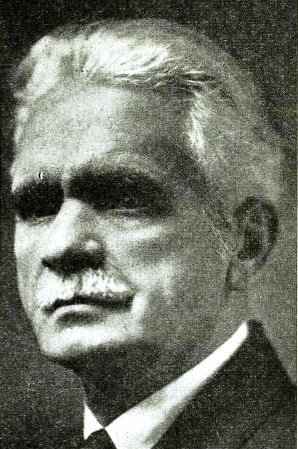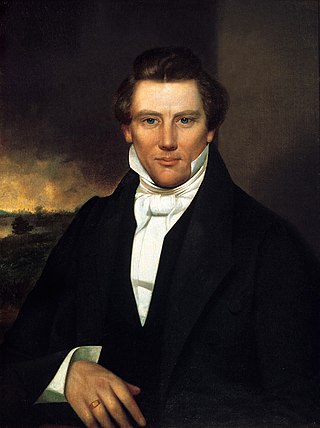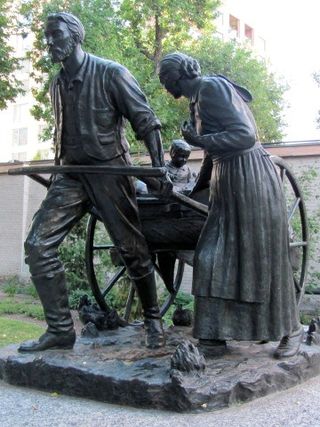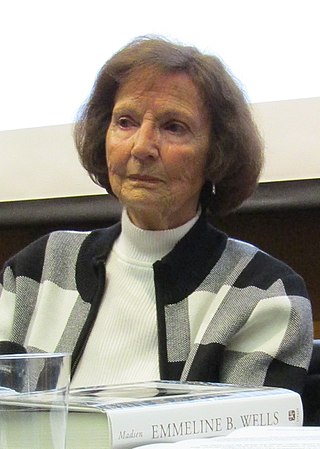Related Research Articles

Mormonism is the religious tradition and theology of the Latter Day Saint movement of Restorationist Christianity started by Joseph Smith in Western New York in the 1820s and 1830s. As a label, Mormonism has been applied to various aspects of the Latter Day Saint movement, although there has been a recent push from the Church of Jesus Christ of Latter-day Saints to distance themselves from this label. A historian, Sydney E. Ahlstrom, wrote in 1982, "One cannot even be sure, whether [Mormonism] is a sect, a mystery cult, a new religion, a church, a people, a nation, or an American subculture; indeed, at different times and places it is all of these." However, scholars and theologians within the Latter Day Saint movement, including Smith, have often used "Mormonism" to describe the unique teachings and doctrines of the movement.

Polygamy was practiced by leaders of the Church of Jesus Christ of Latter-day Saints for more than half of the 19th century, and practiced publicly from 1852 to 1890 by between 20 and 30 percent of Latter-day Saint families.

The Joseph Smith Translation (JST), also called the Inspired Version of the Holy Scriptures (IV), is a revision of the Bible by Joseph Smith, the founder of the Latter Day Saint movement, who said that the JST/IV was intended to restore what he described as "many important points touching the salvation of men, [that] had been taken from the Bible, or lost before it was compiled". Smith died before he deemed it complete, though most of his work on it was performed about a decade beforehand. The work is the King James Version of the Bible (KJV) with some significant additions and revisions. It is considered a sacred text and is part of the canon of Community of Christ (CoC), formerly the Reorganized Church of Jesus Christ of Latter Day Saints, and other Latter Day Saint churches. Selections from the Joseph Smith Translation are also included in the footnotes and the appendix of the LDS-published King James Version of the Bible, but the Church of Jesus Christ of Latter-day Saints has only officially canonized certain excerpts that appear in its Pearl of Great Price. These excerpts are the Book of Moses and Smith's revision of part of the Gospel of Matthew.

Jerald Dee Tanner and Sandra McGee Tanner are American writers and researchers who publish archival and evidential materials about the history of the Church of Jesus Christ of Latter-day Saints. The Tanners founded the Utah Lighthouse Ministry (UTLM), whose stated mission is "to document problems with the claims of Mormonism and compare LDS doctrines with Christianity". As of 2022 Sandra Tanner continues to operate the ministry after Jerald's death in 2006.
During the history of the Latter Day Saint movement, the relationship between Black people and Mormonism has included enslavement, exclusion and inclusion, official and unofficial discrimination, and friendly ties. Black people have been involved with the Latter Day Saint movement since its inception in the 1830s. Their experiences have varied widely depending on the specific denomination within Mormonism, and the time in history of their involvement. From the mid-1800s to 1978, Mormonism's largest denomination, the Church of Jesus Christ of Latter-day Saints barred Black women and men from participating in ordinances of its temples necessary for the highest level of salvation, prevented most men of Black African descent from being ordained to the church's lay, all-male priesthood, supported racial segregation in its communities and schools, taught that righteous Black people would be made White after death, and opposed interracial marriage. The temple and priesthood racial restrictions were lifted by top leaders in 1978. In 2013 the church disavowed its previous teachings on race for the first time.

Brigham Henry Roberts was a historian, politician, and leader in the Church of Jesus Christ of Latter-day Saints. He edited the seven-volume History of the Church of Jesus Christ of Latter-day Saints and independently wrote the six-volume Comprehensive History of the Church of Jesus Christ of Latter-day Saints. Roberts also wrote Studies of the Book of Mormon—published posthumously—which discussed the validity of the Book of Mormon as an ancient record. Roberts was denied a seat as a member of United States Congress because of his practice of polygamy.
David Whitmer was a leader in the Church of Jesus Christ of Latter Day Saints who eventually became the most interviewed of the Three Witnesses to the Book of Mormon's golden plates.
Dennis Michael Quinn was an American historian who focused on the history of The Church of Jesus Christ of Latter-day Saints. He was a professor at Brigham Young University (BYU) from 1976 until he resigned in 1988. At the time, his work concerned church involvement with plural marriage after the 1890 Manifesto, when new polygamous marriages were officially prohibited. He was excommunicated from the church as one of the September Six and afterwards was openly gay. Quinn nevertheless identified as a Latter-day Saint and continued to believe in many LDS teachings, though he did not actively practice the faith.

Polygamy in the Church of Jesus Christ of Latter Day Saints, or plural marriage, is generally believed to have originated with the founder of Mormonism, Joseph Smith. According to several of his associates, Smith taught that polygamy was a divine commandment and practiced it personally, by some accounts marrying more than 30 women, some of whom had existing marriages to other men. Evidence for Smith's polygamy is provided by the church's "sealing" records, affidavits, letters, journals, and diaries. However, until his death, Smith and the leading church quorums denied that he preached or practiced polygamy. Smith's son Joseph Smith III, his widow Emma Smith, and the Reorganized Church of Jesus Christ of Latter Day Saints challenged the evidence and taught that Joseph Smith had opposed polygamy. They instead claimed that Brigham Young, the head of the Church of Jesus Christ of Latter-day Saints, introduced plural marriage after Smith's death. In 1852, leaders of the Utah-based LDS Church publicly announced the doctrine of polygamy.

There are many works relating to Joseph Smith. These works cover Joseph Smith's his life, legacy, and teachings. Smith is the author of several works of scripture, and several personal histories, letters, and other writings. There have also been several biographies written about him.
Grant Hart Palmer was an American educator best known for his controversial work, An Insider's View of Mormon Origins, which ostensibly led to his disfellowshipment in 2004 from the Church of Jesus Christ of Latter-day Saints.

The Mormon religion is predicated on what are said to be historical events such as the First Vision of Joseph Smith and the historicity of the Book of Mormon, which describes a detailed pre-Columbian history of the Americas. Joseph Fielding Smith, the tenth president of the Church of Jesus Christ of Latter-day Saints, declared that "Mormonism, as it is called, must stand or fall on the story of Joseph Smith. He was either a prophet of God, divinely called, properly appointed and commissioned, or he was one of the biggest frauds this world has ever seen. There is no middle ground." As Jan Shipps has written, "Mormonism, unlike other modern religions, is a faith cast in the form of history," and until after World War II, Mormons did not critically examine the historical underpinnings of their faith; any "profane" investigation of the church's history was perceived "as trespassing on forbidden ground."

Helen Mar Kimball was one of 30 to 40 plural wives of Joseph Smith, founder of the Latter Day Saint movement. She was sealed in marriage to him when she was 14 years old. After his death when she was 16, she married Horace Whitney "for time"; Whitney was the brother of another of Smith's wives. She bore eleven children with Whitney, the first three of whom died at, or soon after, birth. Their son, Orson F. Whitney, became an apostle in the Church of Jesus Christ of Latter-day Saints.
The Church of Jesus Christ of Latter-day Saints has been subject to criticism and sometimes discrimination since its inception.
Brigham Young University Press was the university press of Brigham Young University (BYU).

Carol Cornwall Madsen is an emeritus professor of history at Brigham Young University (BYU) where she was a research historian with the Joseph Fielding Smith Institute for Church History. She also served as associate director of BYU's Women's Research Institute. She has written 50 scholarly articles and several books.
Mark Roscoe Ashurst-McGee is an American historian of the Latter Day Saint movement and editor for the Joseph Smith Papers project.

The John Whitmer Historical Association (JWHA) is an independent, nonprofit organization promoting study, research, and publishing about the history and culture of the Latter Day Saint movement. It is especially focused on the Community of Christ, other midwestern Restoration traditions, and early Mormonism. The Community of Christ's approach to its own history was influenced, in part, by historical problems raised and explored through JWHA publications and conferences, and those of its sister organization, the Mormon History Association. JWHA membership numbers around 400 and is open to all, fostering cooperation with LDS and non-Mormon scholars.
This is a bibliography of works on the Latter Day Saint movement.